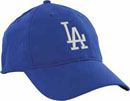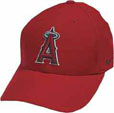I grew up in deep-blue Dodger country north of Los Angeles, where our allegiance to the L.A. team was as solid and sure as that Steve-Garvey-Davey-Lopes-Bill-Russell-Ron-Cey infield. In my world, the region’s other major league franchise, the Angels, was tolerated but ignored, left to hang around in the background like your best friend’s little brother.
 With adulthood, though, my life shifted. Shoeboxes full of trading cards were tucked away. No more family pilgrimages to Chavez Ravine. My interest in Major League Baseball faded. By the ’90s, I would have been hard-pressed to name more than a player or two on my once-favorite team.
With adulthood, though, my life shifted. Shoeboxes full of trading cards were tucked away. No more family pilgrimages to Chavez Ravine. My interest in Major League Baseball faded. By the ’90s, I would have been hard-pressed to name more than a player or two on my once-favorite team.
When I finally settled in the Inland Empire suburbs east of L.A. and Orange counties, I found myself in up-for-grabs-territory: neither Dodgers nor Angels dominated. And to my surprise, among the two teams, it was the Angels who were on the rise.
Then, in 2002, as the Angels made a run for the World Series, the Riverside paper I wrote for at the time threw everything at the story, including me. At one practice, I met and gathered quotes from a bunch of the Angels: Salmon, Spezio, Scioscia. I chowed—purely for journalistic purposes—at the stadium’s fancy Diamond Club restaurant. The Angels vibe seemed a lot like, well, the 1970s Dodgers.
 But even as the halos won the series, I couldn’t get past their past. Where was the proud history, the tried-and-true tradition? L.A.-area bookstore shelves are laden with Dodgers tomes. The Angels are literary laggards by comparison. One key exception, Ross Newhan’s The Anaheim Angels: A Complete History, offers a first chapter titled “The Parade of Agony,” aptly summarizing the team’s early decades. I wasn’t ready to completely ditch the Dodgers.
But even as the halos won the series, I couldn’t get past their past. Where was the proud history, the tried-and-true tradition? L.A.-area bookstore shelves are laden with Dodgers tomes. The Angels are literary laggards by comparison. One key exception, Ross Newhan’s The Anaheim Angels: A Complete History, offers a first chapter titled “The Parade of Agony,” aptly summarizing the team’s early decades. I wasn’t ready to completely ditch the Dodgers.
The next year I had a son, who eventually started playing baseball, which added new depth to the Dodgers-Angels dilemma. One year, Luke was on the Angels. Next, the Dodgers. This spring, he was back on the Angels again, and he was tilting toward them as his favorite major league team as well.
At this point, the biggest baseball stadium Luke had set foot in was the minor-league Rancho Cucamonga Quakes’ Epicenter. I wasn’t just being cheap. I was still mulling the all-important decision of whether his first major-league game should be at Anaheim or Chavez Ravine.
I hatched a plan. Out of tradition, we’d go to Dodger Stadium. But it would be an interleague play game against … the Angels. I bought the tickets for the Memorial Day game two months in advance. We were set.
Not quite.
Weeks before the big game rolled around, my father-in-law presented Luke and me with tickets to the Angels-Astros game at Angel Stadium. The next weekend. He hadn’t known about my plan, and I wasn’t about to try to explain my mental machinations. So Luke’s first major league game was at Anaheim, where the Angels won 4-1, with Mike Trout hitting a homer and a double. Not bad at all.
Memorial Day finally came. Dodger Stadium was packed. The Angels took an early lead, and by the fourth inning, they were up 6-1. The Dodgers rallied back to tie it up. The Angels made it 7-6. The Dodgers tied it up again. Another run. Dodgers won, 8-7.
So close …
Luke now tells me he is leaning toward the Dodgers because “they’ve been around longer.” I am, too. But that doesn’t mean I’ve made a final choice. That can wait until the Dodgers and Angels face each other someday in a freeway World Series. And, by the way things are going for both teams this season, I won’t have to decide for a long, long time.
